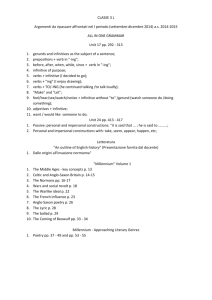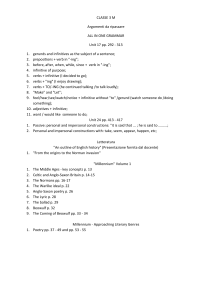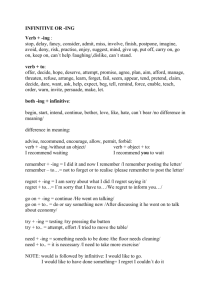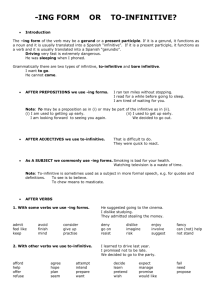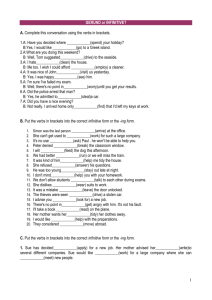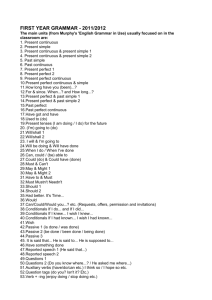Gramatika pro překladatele. Verb Complementation
advertisement
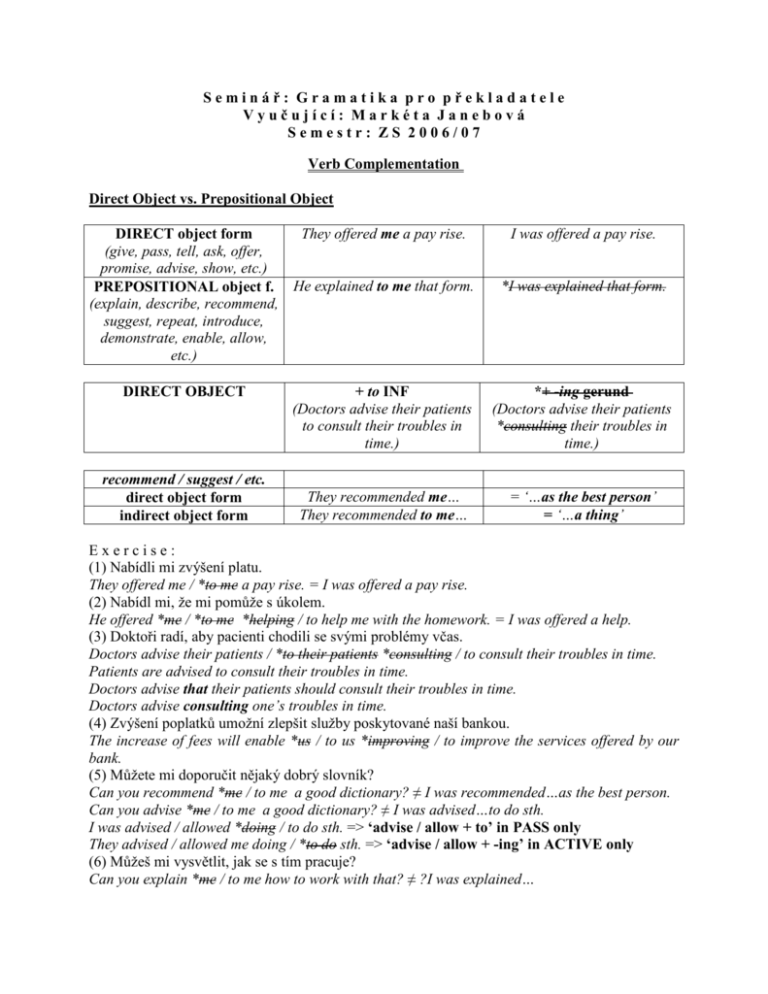
Seminář: Gramatika pro překladatele Vyučující: Markéta Janebová Semestr: ZS 2006/07 Verb Complementation Direct Object vs. Prepositional Object They offered me a pay rise. DIRECT object form (give, pass, tell, ask, offer, promise, advise, show, etc.) PREPOSITIONAL object f. He explained to me that form. (explain, describe, recommend, suggest, repeat, introduce, demonstrate, enable, allow, etc.) DIRECT OBJECT recommend / suggest / etc. direct object form indirect object form I was offered a pay rise. *I was explained that form. + to INF (Doctors advise their patients to consult their troubles in time.) *+ -ing gerund (Doctors advise their patients *consulting their troubles in time.) They recommended me… They recommended to me… = ‘…as the best person’ = ‘…a thing’ Exercise: (1) Nabídli mi zvýšení platu. They offered me / *to me a pay rise. = I was offered a pay rise. (2) Nabídl mi, že mi pomůže s úkolem. He offered *me / *to me *helping / to help me with the homework. = I was offered a help. (3) Doktoři radí, aby pacienti chodili se svými problémy včas. Doctors advise their patients / *to their patients *consulting / to consult their troubles in time. Patients are advised to consult their troubles in time. Doctors advise that their patients should consult their troubles in time. Doctors advise consulting one’s troubles in time. (4) Zvýšení poplatků umožní zlepšit služby poskytované naší bankou. The increase of fees will enable *us / to us *improving / to improve the services offered by our bank. (5) Můžete mi doporučit nějaký dobrý slovník? Can you recommend *me / to me a good dictionary? ≠ I was recommended…as the best person. Can you advise *me / to me a good dictionary? ≠ I was advised…to do sth. I was advised / allowed *doing / to do sth. => ‘advise / allow + to’ in PASS only They advised / allowed me doing / *to do sth. => ‘advise / allow + -ing’ in ACTIVE only (6) Můžeš mi vysvětlit, jak se s tím pracuje? Can you explain *me / to me how to work with that? ≠ ?I was explained… (7) Vysvětlil mi ten vzorec. He explained *me / to me that formula. ≠ ?I was explained… (8) Opakovala mi, co řekl šéf. She repeated *me / to me what the boss had said. ≠ ?I was repeated… (9) Popsal mi situaci. He described *me / to me the situation. ≠ I was described… (10) Podala mi talíř s chlebem. She passed me / *to me a plate with bread. = I was passed a plate with bread. (11) Navrhli jsme mu jiné řešení. We suggested *him / to him another solution. ≠ He was suggested…as the best person. (12) Slíbili mi povýšení. They promised me / *to me a higher post. = I was promised a higher post. (13) Představila mi svou novou kolegyni. She introduced *me / to me her new colleague. ≠ I was introduced to her new colleague. She introduced me to her new colleague. I would like / hate / appreciate …IT… (I don’t like it, when people shout at one another.) if / when + dependent clause Exercise: (14) Byla bych ráda, kdybys na celou věc zapomněl. I would like you *forgetting / to forget the whole thing. I would appreciate / like / hate it, if you could forget the whole thing. (15) Nemám ráda, když na sebe lidi křičí. I hate people shouting / *to shout at one another. I don’t like it, when people shout at one another. (16) Zvýšení poplatků umožní zlepšit služby poskytované naší bankou. The increase of fees will enable *us / to us *improving / to improve the services offered by our bank. Infinitive vs. –ing -ing gerund to infinitive a general (and/or repeated) actions (She really dislikes doing the dishes.) an individual single action (I like to leave my desk neat and tidy when I finish work.) (1a) begin, start, continue, keep (on), go on, finish, give up, stop + -ing (1b) begin, start, stop + infinitive (2a) like, love, enjoy, feel like, tolerate, miss, mind, can’t help, dislike, detest, hate + -ing (2b) like, love, hate + infinitive (3a) agree, admit, decline, deny, refuse, excuse, forgive, remember (= past action), recall + -ing (3b) remember (= future action) + infinitive (4a) suggest, propose, plan, intend, decide, promise, prepare, offer, aim, try (= experiment), ask, demand, fail, manage, hesitate, avoid, pretend + -ing (4b) propose, try (= effort) + infinitive (5) delay, postpone, put off + -ing (6a) agree, agree on, aim, aim at, attempt, attempt at, bother, bother about, get to, succeed, succeed in + -ing (-ing required by the prepositions) (6b) get to (= have chance) + infinitive (‘I hardly ever get to drive a car.’) (7) feel, hear, notice, observe, overhear, see, watch + -ing (8a) advise, encourage, allow + -ing (8b) advise, encourage, allow + object + infinitive Exercise: I like * leaving / to leave my desk neat and tidy when I finish work. - an individual single action She really dislikes doing / * to do the dishes. - a general and repeated action Would you like * going / to go to a film? No, I prefer * watching / to watch TV. - an individual single action I’d prefer to buy some books rather than * to / 0 spend the money on CDs. > I prefer buying / * to buy some books rather than spending / * to spend the money on CDs. - a general action: (a) bare infinitive > (b) –ing gerund I remember having / * to have seen him as a boy. remember (past action) => -ing gerund x remember (future action) => to infinitive I wonder if we’ll succeed in getting / * to get tickets for the film? - an individual single action => succeed in + -ing He suggested * the students / to the students working / * to work harder. > He suggested to the students that they (should) work harder. > He suggested that the students (should) work harder. - an indirect object => -ing gerund David suggested going / * to go to the theatre. > David suggested that we go to the theatre. suggest => -ing gerund Why * to / 0 study English? x Where to / * 0 go? - special construction x common question It’s no use * of / in being angry. > There’s no use in being angry. - the structure: be no use in > it’s not use = there’s no use Is there any use in trying / * to try the exam tomorrow? - an individual single action x but: the structure be no use in She was so deeply in debt that there was no possibility of getting / * to get straight. - the structure: possibility of I’m used to getting / * get up early. - the structure: be used to –ing Listening to tapes is the best way * how to improve / to improve / of improving your English. - the structure: the best way to / of –ing It’s worth visiting / * to visit the National Museum. > The National Museum is worth visiting / * to visit. - the structure: be worth –ing I think that book is worth reading * it / 0. - no double reference to one entity within a single clause I like to go to my dentist. = It’s a good thing to do. x I like going to my dentist each six months. = - I love my dentist. Exercise: He is afraid of…walking to home at night. = He is afraid to…walk to home at night. He is afraid of…losing his passport. [an accident] x He is afraid to…wake him up. He always gets angry. [an activity] My jacket needs…cleaning. [-ing with a passive meaning] x My jacket needs to…be cleaned. I regret to…inform you that you are sacked. [a future action] x I regret…doing the wrong thing. [a past action] He went on to…discuss another topic. > He went on to…become a famous writer. = Later he became a famous writer. [two actions] x He went on…discussing the same topic. [one action] Did you remember to…bring wine? Or did you forget it? [remembering / forgetting to complete an action] x She didn’t remember…bringing wine. She had a blackout. [recalling the act of a past action] He stopped…smoking. [one action] x He stopped to…have a smoke. [two actions] He tried to…speak English. But he is weak in learning languages. [an effort] x He tried…speaking English. But nobody spoke English there. [an experiment]
